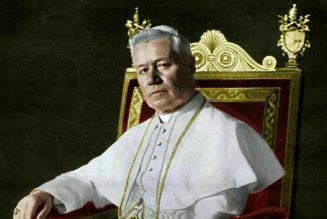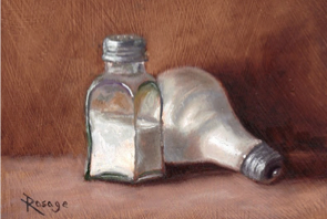
The death of Jesus Christ on the cross revealed the greatest act of love that destroyed the works of the Devil, defeated the authority of sin and death, and provided a salvific path for all God’s children to embrace if chosen. Jesus’ death was not an accident or a mistake in judgment by a few unruly men. The entire mystery of Jesus’ life, death, and resurrection reveals a divine plan of redemption to free men from the slavery of sin.[1] St. Paul reminds us of this when he proclaims that Christ died for our sins in accordance with the scriptures.[2]
Jesus explained his role as the suffering servant to his disciples on the Road to Emmaus carefully narrative the salvific events that had taken place and culminating this narrative with the celebration of the Mass with his Apostles. It is important to note that Jesus’ ministry began with a baptism with and amongst sinners. He placed himself within the realm of man’s sinful state and proposed to offer man an opportunity at redemption.
The Catechism describes Jesus’ death as a unique sacrifice,
First, it is a gift from God the Father himself, for the Father handed his Son over to sinners in order to reconcile us with Himself. At the same time, it is the offering of the Son of God made man, who in freedom and love offered his life to his Father through the Holy Spirit in reparation for our disobedience.[3]
How does this one salvific act of love help us become more aware of our journey toward Pentecost? St. Paul’s letter to the Galatians provides us with a blueprint of where our focus should be in anticipation of the Holy Spirit,
But I say, walk by the Spirit, and do not gratify the desires of the flesh. For the desires of the flesh are against the Spirit, and the desires of the Spirit are against the flesh; for these are opposed to each other, to prevent you from doing what you would. But if you are led by the Spirit you are not under the law. Now the works of the flesh are plain: immorality, impurity, licentiousness, idolatry, sorcery, enmity, strife, jealousy, anger, selfishness, dissension, party spirit, envy, drunkenness, carousing, and the like. I warn you, as I warned you before, that those who do such things shall not inherit the kingdom of God. But the fruit of the Spirit is love, joy, peace, patience, kindness, goodness, faithfulness, gentleness, and self-control; against such there is no law. And those who belong to Christ Jesus have crucified the flesh with its passions and desires.[4]
Understanding the Road to Pentecost
If there is something significant about our journey to Pentecost is that our life is no longer at the mercy of the desires of the flesh. We have received a newfound hope in Jesus Christ where our desire for the love of Jesus surpasses the desires of the flesh. Now, our identity as God’s child and Jesus’ disciple is rooted in our openness to be guided by the Holy Spirit who is the advocate, consoler, and paraclete. We now become more aware of who we are as disciples of Jesus Christ enabling us to know and understand sin, righteousness, and judgment.
Awakening our Christian Identity
The Catechism reminds us that we have a joint mission to proclaim the Word of God and demonstrate how to actively live a life according to the proclamation of the Gospel. This new way of living will be confirmed on Pentecost where now we encounter the fullness of the Holy Trinity.
Since that day, the Kingdom announced by Christ has been open to those who believe in him: in the humility of the flesh and in faith, they already share in the communion of the Holy Trinity. By his coming, which never ceases, the Holy Spirit causes the world to enter into the “last days,” the time of the Church, the Kingdom already inherited though not yet consummated[5]
Our preparation for the descent of the Holy Spirit requires us to remove all selfish and sinful desires and place our complete trust in the will of God through the Son. Whether through a personal examination of conscience, exercise in praying with the Scriptures through Lectio Divina, the prayer of the litany of the saints, engaging in a Marian consecration, daily mass attendance, daily recitation of the rosary, or divine mercy chaplet, Eucharistic Adoration and the active participation in the sacrifice of the Mass on Sunday, the Lord’s Day; these elements of faith serve as a means to spiritually strengthen our relationship with Christ in anticipation of the Holy Spirit.
The descent of the Spirit serves as a culmination of God’s love for his children through the offering of his Son in death. This gives us the impetus to live a life of daily surrender to God the Father so that through the Son we can embrace His love and grow in wisdom through the Holy Spirit. In the end, our life is predicated on how we freely choose to embrace Jesus Christ in our lives under the guidance of the Holy Spirit.
Come, Holy Spirit, come!
And from your celestial home
Shed a ray of light divine!
Come, Father of the poor!
Come, source of all our store!
Come, within our bosoms shine.
You, of comforters the best;
You, the soul’s most welcome guest;
Sweet refreshment here below;
In our labor, rest most sweet;
Grateful coolness in the heat;
Solace in the midst of woe.
O most blessed Light divine,
May that light within us shine
And our inmost being fill!
Where you are not, we have naught,
Nothing good in deed or thought,
Nothing free from taint and ill.
Heal our wounds, our strength renew;
On our dryness pour your dew;
Wash the stains of guilt away:
Bend the stubborn heart and will;
Melt the frozen, warm the chill;
Guide the steps that go astray.
On the faithful, who adore
And confess you, evermore
In your sevenfold gift descend;
Give them virtue’s sure reward;
Give them your salvation, Lord;
Give them joys that never end.
Amen. Alleluia.
[4] Gal 5:16-23







![Long slide looms for world population, with sweeping ramifications that are hard to fathom [NYTimes paywall]…](https://salvationprosperity.net/wp-content/uploads/2021/05/long-slide-looms-for-world-population-with-sweeping-ramifications-that-are-hard-to-fathom-nytimes-paywall-327x219.jpg)
